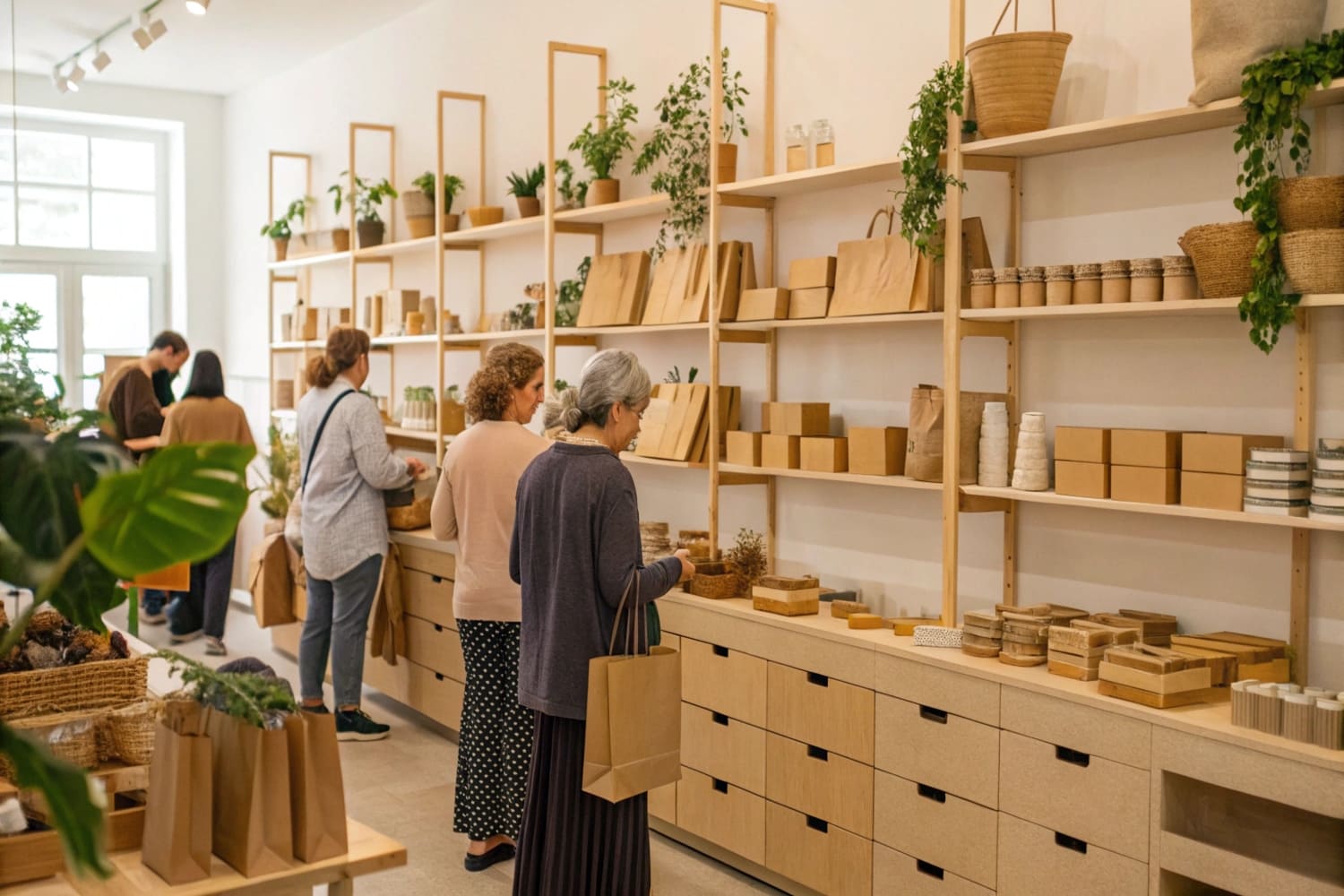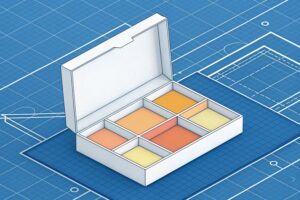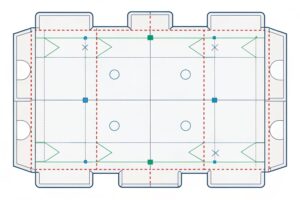I see brands chase lower costs and greener choices. I also see buyers demand fast launches. Kraft paper sits in the middle. It solves both.
Kraft paper is a strong, recyclable paper made from chemical pulp with minimal bleaching; it offers high tear resistance, printability, and low cost, which makes it a preferred choice for packaging, displays, and protective wraps.
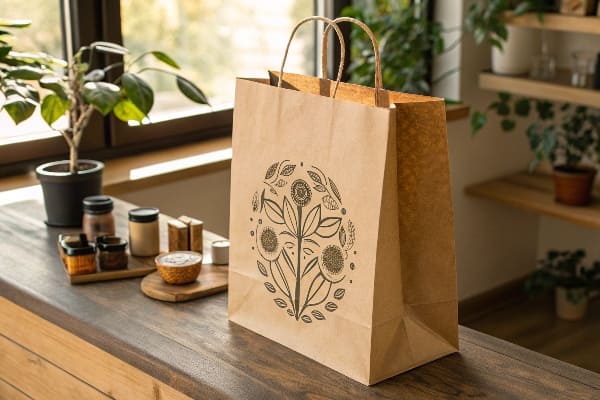
I run PopDisplay, a cardboard displays factory. I talk to buyers every week. They want strength, speed, and clean graphics. They also want sustainable materials. Kraft paper helps me bridge those needs. I use it on trays, sleeves, and boxes around our POP displays. It keeps products safe in transit. It also gives a natural look in stores.
What are the advantages of kraft paper packaging?
Rising freight costs scare many teams. Damaged goods scare them more. I use kraft when they need strength without heavy weight.
Kraft paper packaging is strong, light, recyclable, and cost-effective; it protects products, runs well on digital or flexo presses, accepts clean die-cuts, and supports quick-turn projects with minimal waste.
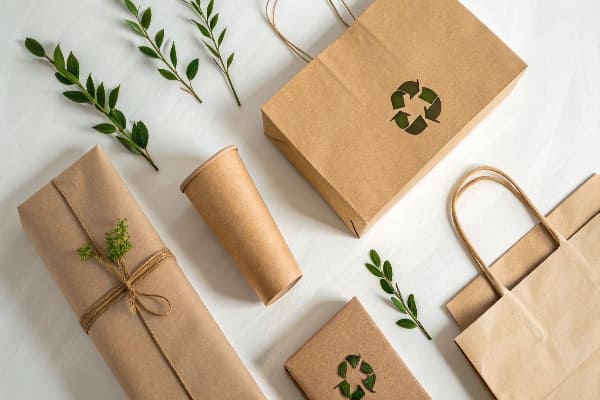
How kraft paper1 advantages show up in real projects
I see advantages best on tight retail timelines. My team prints short runs fast. Digital presses love uncoated kraft. Ink dries fast. We move to cutting in hours, not days. Shipping costs stay low because kraft is light. Strength still holds up. Tear resistance saves the corners that take hits during loading.
I used kraft for a hunting accessories launch for a North American buyer. He needed pallet displays and PDQ trays to ship into big-box stores. The schedule was strict. We lined each display with a kraft sleeve and used kraft inserts to lock the bows in place. The sleeves replaced plastic films. The trays stacked tight on pallets. The store teams could set them in minutes. Damages fell. Setup time dropped. The natural look also matched the brand’s outdoor tone. The buyer extended the campaign for another season. That decision came from lower returns and faster resets.
Quick view
| Benefit | What it means for packaging | Why buyers care |
|---|---|---|
| Strength-to-weight | High tear and burst strength with low basis weight | Fewer damages and lower freight |
| Recyclability | Widely accepted in paper streams | Meets sustainability goals |
| Print-friendly | Works with flexo, digital, and screen | Short runs and seasonal promos |
| Converting ease | Clean die-cuts and folds | Faster prototyping and assembly |
| Cost control | Less material and simpler coatings | Fits promo budgets |
What is kraft paper packaging?
Many people ask if kraft is a style or a material. It is a material first. The style comes from its natural look.
Kraft paper packaging uses unbleached or lightly bleached kraft paper to make boxes, sleeves, bags, wraps, and protective pads that balance strength, cost, and sustainability.
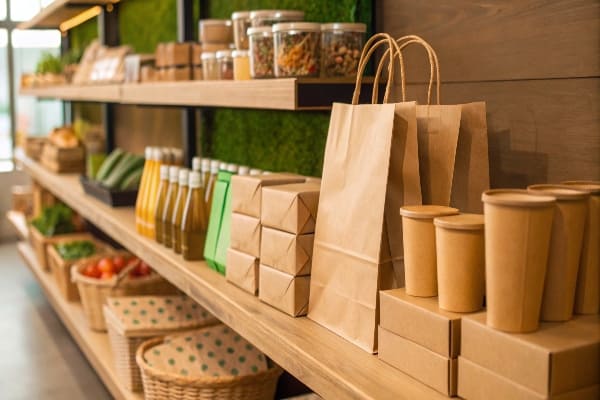
Components and formats I ship most often
Kraft shows up as carton sleeves, corrugated outers, and inserts. The paper can be virgin fiber for high strength. It can be recycled fiber for a lower footprint. I choose basis weight by product weight and shelf life. For POP displays, I use kraft liners2 on corrugated boards. I sometimes pair a white top liner for color-critical art. I add a water-based varnish to resist scuffs in store aisles. I avoid plastic lamination unless the environment is very wet.
I think of packaging as a system. The primary box holds the product. The secondary carton holds many primary boxes. The transit outer holds many secondary cartons. Kraft fits each layer with different grades. When a buyer wants rapid scale, I lock specs with simple rules. Example: 200–250 gsm kraft for sleeves, E-flute with kraft liner for PDQ trays, and double-wall kraft3 for pallet displays. This set works for most FMCG, beauty, and outdoor gear. It keeps print stable. It keeps edges strong. It keeps material SKUs short, so I can buy faster and cheaper.
Typical kraft formats
| Format | Use case | Common spec |
|---|---|---|
| Sleeve | Wraps retail carton or tray | 200–300 gsm kraft |
| Mailer | E-commerce shipping | E-flute with kraft liners |
| PDQ tray | Shelf or checkout | E-flute + kraft top liner |
| Pallet display shell | Warehouse-to-aisle | Double-wall with kraft |
| Protective wrap | Void fill and surface guard | 60–90 gsm kraft roll |
What are the pros and cons of kraft paper?
No material is perfect. Kraft is close for many jobs. Limits still matter.
Pros: strong, recyclable, light, cost-effective, fast to print and convert; Cons: color range is limited on brown stock, moisture resistance needs coatings, long-term outdoor use is weak without barrier layers.
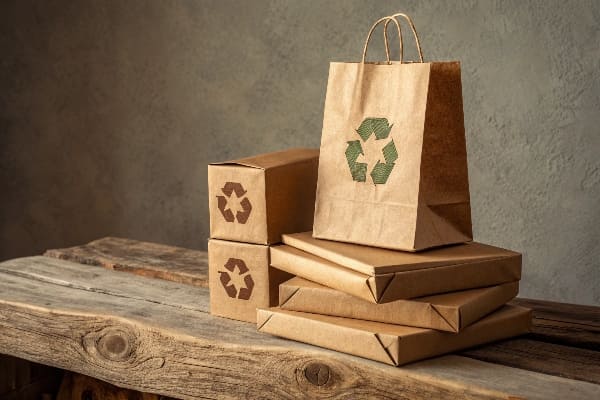
Balancing trade-offs in real timelines
I weigh trade-offs by channel and season. If a brand wants neon colors, I add a white top sheet or use white kraft. If a campaign runs in humid stores, I add water-based dispersion coatings4. If pallets cross rainy docks, I spec PE-free moisture barriers that still pass recycling streams in many regions. I test glue lines because kraft can absorb water fast. I switch to hot-melt or stronger water-based adhesives when needed.
I ran a crossbow accessory endcap last fall. The art had deep blacks and a bright safety orange. On brown kraft the orange looked muted. I added a white print-underlayer only on the logo and product zone. The rest stayed natural to save cost and keep the eco look. We hit color goals without changing the stock. On the logistics side, I added edge crush tests5 on the outer cartons. I confirmed stacks could handle four high for 48 hours. The buyer avoided corner crush during a warehouse delay. The extra test cost less than 1% of the job but saved the launch.
Pros vs cons
| Aspect | Pros | Cons | My fix |
|---|---|---|---|
| Color | Warm, natural tone | Limited vibrancy | Spot white underlayer |
| Moisture | Breathable and light | Swells when wet | Water-based coating |
| Strength | High tear and ECT | Long-term creep under load | Better flute or double-wall |
| Cost | Affordable and simple | Add-ons raise cost | Targeted coating only |
| Sustainability | Recyclable widely | Some barriers complicate streams | Choose PFAS-free, PE-free options |
What is craft paper used for?
Many people use “craft” when they mean “kraft.” I hear both in calls. I clear it up early to avoid errors.
“Craft paper” often means paper used for arts and crafts, while “kraft paper” is the strong packaging paper used for boxes, bags, wraps, displays, and protective pads.
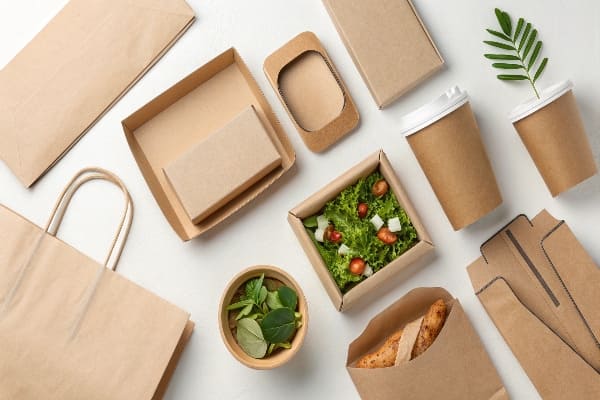
Where I deploy kraft day to day
I use kraft for retail-ready trays, pallet skirts, header cards, and inner pads. I also use it for anti-scuff interleaves between printed panels. For e-commerce kits, I replace bubble wrap with die-cut kraft honeycomb pads. For fragile beauty items, I fold kraft inserts that lock bottles without foam. For outdoor gear, I use double-wall kraft outers with reinforced corners. These choices cut plastics and speed kitting.
A short story explains impact. A U.S. buyer from an outdoor brand needed 1,200 pallet displays for a fall hunt season. The deadline was tight. The product was heavy. I swapped foam forms for die-cut kraft braces6. I kept the display footprint the same. I raised edge crush strength7 by switching to a higher flute with kraft liners. I also added numbered kraft setup tabs, so store staff could assemble without tools. We shipped flat. The warehouse team built the first unit in eight minutes. Last season, the same task took twenty. Returns dropped. The brand extended the PO for spring. The savings paid for better graphics on the next run.
Use cases at a glance
| Use | Why kraft works | Notes |
|---|---|---|
| Retail trays (PDQ) | Light, strong, easy print | Add scuff varnish |
| Pallet skirts | Natural look, quick die-cut | Use double-wall for load |
| Protective pads | Cheap, recyclable | Replace bubble wrap |
| Header cards | Fast print, easy punch | Spot white for logos |
| Mailers | Compact, sturdy | E-flute, tear strip optional |
Conclusion
Kraft paper gives me strength, speed, and a natural look. It helps me meet deadlines and budgets. It also supports real sustainability goals across displays and packaging.
Explore the advantages of kraft paper in packaging, including its strength, recyclability, and cost-effectiveness. ↩
Explore this link to understand the versatility and applications of kraft liners in various packaging solutions. ↩
Discover the advantages of double-wall kraft in packaging, ensuring strength and durability for your products. ↩
Explore this link to understand how water-based dispersion coatings enhance product durability and sustainability. ↩
Learn about edge crush tests to see how they ensure packaging strength and prevent damage during transport. ↩
Explore this link to understand how die-cut kraft braces enhance packaging efficiency and sustainability. ↩
Learn about edge crush strength to see how it impacts the durability and effectiveness of your packaging solutions. ↩

